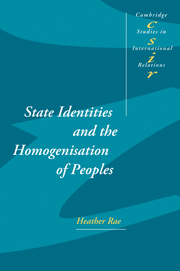Book contents
- Frontmatter
- Contents
- Preface
- Introduction
- 1 State formation and pathological homogenisation
- 2 The ‘other’ within Christian Europe: state-building in early modern Spain
- 3 State-building in early modern France: Louis XIV and the Huguenots
- 4 Pathological homogenisation and Turkish state-building: the Armenian genocide of 1915–1916
- 5 ‘Ethnic cleansing’ and the breakup of Yugoslavia
- 6 Evolving international norms
- 7 On the threshold: the Czech Republic and Macedonia
- Conclusion
- Bibliography
- Index
- CAMBRIDGE STUDIES IN INTERNATIONAL RELATIONS
3 - State-building in early modern France: Louis XIV and the Huguenots
Published online by Cambridge University Press: 22 September 2009
- Frontmatter
- Contents
- Preface
- Introduction
- 1 State formation and pathological homogenisation
- 2 The ‘other’ within Christian Europe: state-building in early modern Spain
- 3 State-building in early modern France: Louis XIV and the Huguenots
- 4 Pathological homogenisation and Turkish state-building: the Armenian genocide of 1915–1916
- 5 ‘Ethnic cleansing’ and the breakup of Yugoslavia
- 6 Evolving international norms
- 7 On the threshold: the Czech Republic and Macedonia
- Conclusion
- Bibliography
- Index
- CAMBRIDGE STUDIES IN INTERNATIONAL RELATIONS
Summary
In 1685 King Louis XIV ordered the Revocation of the Edict of Nantes, and thus effectively outlawed Protestantism in France. The Edict was originally promulgated in 1598 by Louis's grandfather, Henry IV, in an effort to negotiate principles of coexistence between the then politically and militarily powerful French Protestants, or Huguenots as they were known, and the French monarchy. Despite a prohibition on Protestants leaving France, the Revocation, along with the persecution that preceded and followed it, resulted in an estimated 200,000 refugees fleeing the country. Yet at the time of the Revocation the Huguenot population no longer posed any political or military threat to the French state. This raises the question of why the monarch and his advisers would choose this path when any threat posed by Huguenots to the political stability of the state was long past. Why did they pursue a policy that caused more problems than it solved domestically, that was bound to alienate Protestant states across Europe, and that abrogated the terms of the Peace of Westphalia, which had been accepted across Europe? Though Louis XIV may have considered that this policy was in the interest of the state, this begs the question of how this interest was understood by him and his advisers. Why was the forcible imposition of religious uniformity seen to be in the interest of the state, in an age when the religious wars had passed but when the memory of their devastating effect on Europe, including France, was still strong?
- Type
- Chapter
- Information
- State Identities and the Homogenisation of Peoples , pp. 83 - 123Publisher: Cambridge University PressPrint publication year: 2002



